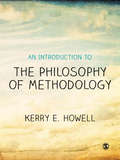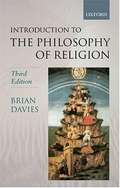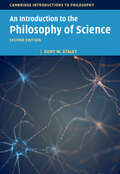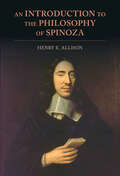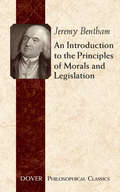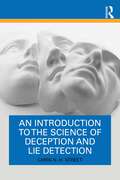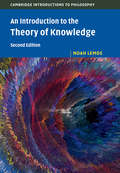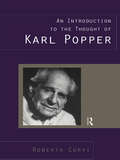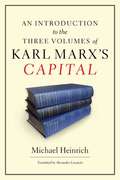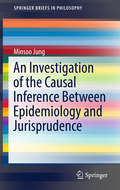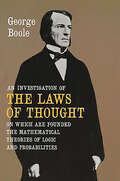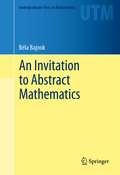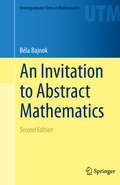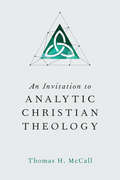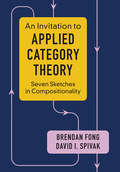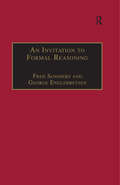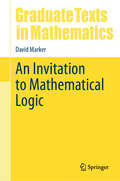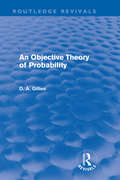- Table View
- List View
An Introduction to the Philosophy of Mathematics
by Mark ColyvanThis introduction to the philosophy of mathematics focuses on contemporary debates in an important and central area of philosophy. The reader is taken on a fascinating and entertaining journey through some intriguing mathematical and philosophical territory, including such topics as the realism/anti-realism debate in mathematics, mathematical explanation, the limits of mathematics, the significance of mathematical notation, inconsistent mathematics and the applications of mathematics. Each chapter has a number of discussion questions and recommended further reading from both the contemporary literature and older sources. Very little mathematical background is assumed and all of the mathematics encountered is clearly introduced and explained using a wide variety of examples. The book is suitable for an undergraduate course in philosophy of mathematics and, more widely, for anyone interested in philosophy and mathematics.
An Introduction to the Philosophy of Methodology
by Kerry E HowellThis book provides students with a concise introduction to the philosophy of methodology. The book stands apart from existing methodology texts by clarifying in a student-friendly and engaging way distinctions between philosophical positions, paradigms of inquiry, methodology and methods. Building an understanding of the relationships and distinctions between philosophical positions and paradigms is an essential part of the research process and integral to deploying the methodology and methods best suited for a research project, thesis or dissertation. Aided throughout by definition boxes, examples and exercises for students, the book covers topics such as: - Positivism and Post-positivism - Phenomenology - Critical Theory - Constructivism and Participatory Paradigms - Post-Modernism and Post-Structuralism - Ethnography - Grounded Theory - Hermeneutics - Foucault and Discourse This text is aimed at final-year undergraduates and post-graduate research students. For more experienced researchers developing mixed methodological approaches, it can provide a greater understanding of underlying issues relating to unfamiliar techniques.
An Introduction to the Philosophy of Psychology
by Fred Adams Daniel A. WeiskopfPsychology aims to give us a scientific account of how the mind works. But what does it mean to have a science of the mental, and what sort of picture of the mind emerges from our best psychological theories? This book addresses these philosophical puzzles in a way that is accessible to readers with little or no background in psychology or neuroscience. Using clear and detailed case studies and drawing on up-to-date empirical research, it examines perception and action, the link between attention and consciousness, the modularity of mind, how we understand other minds, and the influence of language on thought, as well as the relationship between mind, brain, body, and world. The result is an integrated and comprehensive overview of much of the architecture of the mind, which will be valuable for both students and specialists in philosophy, psychology, and cognitive science.
An Introduction to the Philosophy of Religion
by Michael J. Murray Michael C. ReaAn Introduction to the Philosophy of Religion provides a broad overview of the topics which are at the forefront of discussion in contemporary philosophy of religion. Prominent views and arguments from both historical and contemporary authors are discussed and analyzed. The book treats all of the central topics in the field, including the coherence of the divine attributes, theistic and atheistic arguments, faith and reason, religion and ethics, miracles, human freedom and divine providence, science and religion, and immortality. In addition it addresses topics of significant importance that similar books often ignore, including the argument for atheism from hiddenness, the coherence of the doctrines of the Trinity and the Incarnation, and the relationship between religion and politics. It will be a valuable accompaniment to undergraduate and introductory graduate-level courses.
An Introduction to the Philosophy of Religion (Third Edition)
by Brian Davies<p>The third edition of An Introduction to the Philosophy of Religion provides a critical examination of some fundamental questions posed by religious belief: What does belief in God amount to? Can God's existence be proved? Is there life after death? <p>Brian Davies considers these questions and many others, sometimes offering provocative answers of his own, but more often giving readers room to each independent conclusions. He explains how a range of thinkers have approached the subject -- including Anselm, Aquinas, Descartes, Leibniz, Hume, and Kant -- and also discusses how contemporary author now engage with the issues involved. Completely revised to cover the latest developments in the field, the new edition of this established textbook will prove the ideal introduction for all students of the philosophy of religion.</p>
An Introduction to the Philosophy of Science
by Kent W. StaleyThis book guides readers by gradual steps through the central concepts and debates in the philosophy of science. Using concrete examples from the history of science, Kent W. Staley shows how seemingly abstract philosophical issues are relevant to important aspects of scientific practice. Structured in two parts, the book first tackles the central concepts of the philosophy of science, such as the problem of induction, falsificationism, and underdetermination, and important figures and movements, such as the logical empiricists, Thomas Kuhn, and Paul Feyerabend. The second part turns to contemporary debates in the philosophy of science, such as scientific realism, explanation, the role of values in science, the different views of scientific inference, and probability. This broad yet detailed overview will give readers a strong grounding whilst also providing opportunities for further exploration. It will be of particular interest to students of philosophy, the philosophy of science, and science.
An Introduction to the Philosophy of Science (Cambridge Introductions to Philosophy)
by Kent W. StaleyThis thoroughly updated second edition guides readers through the central concepts and debates in the philosophy of science. Using concrete examples from the history of science, Kent W. Staley addresses questions about what science is, why it is important, and the basis for trust in scientific results. The first part of the book introduces the central concepts of philosophy of science, with updated discussions of the problem of induction, underdetermination, rationality, scientific progress, and important movements such as falsificationism, logical empiricism, and postpositivism, together with a new chapter on social constructionism. The second part offers updated chapters on probability, scientific realism, explanation, and values in science, along with new discussions of the role of models in science, science in policy-making, and feminist philosophy of science. This broad yet detailed overview will give readers a strong grounding in philosophy of science whilst also providing opportunities for further exploration.
An Introduction to the Philosophy of Spinoza
by Henry E. AllisonAimed at those new to studying Spinoza, this book provides a comprehensive introduction to his thought, placing it in its historical and philosophical contexts, and assessing its critical reception. In addition to providing an analysis of Spinoza's metaphysical, epistemological, psychological, and ethical views in the Ethics, Henry Allison also explores his political theory and revolutionary views on the Bible, as well as his account of Judaism, which led to the excommunication of the young Spinoza from the Jewish community in Amsterdam. Although the book's main focus is on the analysis of Spinoza's views, including a close reading of the central arguments of the Ethics, it also considers many of the standard objections to these arguments as well as possible responses to them. This completely revised and updated new edition of Allison's classic book, with two new chapters, will help a new generation of students to understand and value Spinoza's work.
An Introduction to the Principles of Morals and Legislation (Barnes And Noble Library Of Essential Reading)
by Jeremy BenthamFirst published in 1789, Jeremy Bentham's best-known work remains a classic of modern philosophy and jurisprudence. Its definitions of the foundations of utilitarian philosophy and its groundbreaking studies of crime and punishment retain their relevance to modern issues of moral and political philosophy, economics, and legal theory.Based on the assumption that individuals seek pleasure and avoid pain, Bentham's utilitarian perspective forms a guide to moral decision-making. With the "greatest happiness of the greatest number" as his objective, the author attempts to identify the sources and varieties of pleasure and pain as well as the ways in which they can be measured in assessing moral options. Considerations of intentionality, consciousness, motives, and dispositions support Bentham's arguments. The text concludes with his survey of purpose and the role of law and jurisprudence, a fascinating exercise in the theory of social reform that explores conflicts between the interests of the majority and individual freedom.
An Introduction to the Science of Deception and Lie Detection
by Chris N. StreetThis accessible book provides a foundational understanding of the science of deception and lie detection. Focusing on core issues for the field, it discusses classic and current psychological research into lying as well as theoretical approaches to understanding human lie detection. This book explores engaging questions around how people lie, how people make decisions about believing others, and how we can detect deception. Each chapter is clearly structured to support students of all levels by summarising content, presenting key research, and systematically evaluating findings. Chapters explore topics including some of the most promising current lie detection techniques, how and why people lie, how lying develops in children, and whether unconscious thinking can boost lie detection accuracy. Providing an overview of key issues in deception, this book will be of great interest to students and lecturers in the field of deception and lie detection, as well as anyone generally interested in this fascinating field of research.
An Introduction to the Theory of Knowledge
by Noah LemosA clear and accessible introduction to epistemology or the theory of knowledge.
An Introduction to the Theory of Knowledge (Cambridge Introductions to Philosophy)
by Noah LemosNow revised and containing three new chapters, this book provides a clear and accessible introduction to epistemology, or the theory of knowledge. It discusses some of the main theories of justification, including foundationalism, coherentism, reliabilism, and virtue epistemology. Other topics include the Gettier problem, internalism and externalism, skepticism, the problem of epistemic circularity, a priori knowledge, naturalized epistemology, and the epistemic significance of testimony and disagreement. Intended primarily for students taking their first classes in epistemology, this lucid and well-written text will provide an excellent introduction to anyone interested in knowing more about this important area of philosophy.
An Introduction to the Thought of Karl Popper
by Roberta CorviThis is a comprehensive introduction to the philosophical and political thought of Karl Popper, now available in English. It is divided into three parts; the first part provides a biography of Popper; the second part looks at his works and recurrent themes, and the third part assesses his critics. It was approved of by Popper himself as a sympathetic and comprehensive study, and will be ideal to meet the increasing demand for a summary introduction to his work.
An Introduction to the Three Volumes of Karl Marx's Capital
by Michael Heinrich Alex LocascioThe global economic crisis and recession that began in 2008 had at least one unexpected outcome: a surge in sales of Karl Marx's Capital. Although mainstream economists and commentators once dismissed Marx's work as outmoded and flawed, some are begrudgingly acknowledging an analysis that sees capitalism as inherently unstable. And of course, there are those, like Michael Heinrich, who have seen the value of Marx all along, and are in a unique position to explain the intricacies of Marx's thought. Heinrich's modern interpretation of Capital is now available to English-speaking readers for the first time. It has gone through nine editions in Germany, is the standard work for Marxist study groups, and is used widely in German universities. The author systematically covers all three volumes of Capital and explains all the basic aspects of Marx's critique of capitalism in a way that is clear and concise. He provides background information on the intellectual and political milieu in which Marx worked, and looks at crucial issues beyond the scope of Capital, such as class struggle, the relationship between capital and the state, accusations of historical determinism, and Marx's understanding of communism. Uniquely, Heinrich emphasizes the monetary character of Marx's work, in addition to the traditional emphasis on the labor theory of value, this highlighting the relevance of Capital to the age of financial explosions and implosions.
An Investigation of the Causal Inference between Epidemiology and Jurisprudence (SpringerBriefs in Philosophy)
by Minsoo JungThis book examines how legal causation inference and epidemiological causal inference can be harmonized within the realm of jurisprudence, exploring why legal causation and epidemiological causation differ from each other and defining related problems. The book also discusses how legal justice can be realized and how victims' rights can be protected. It looks at epidemiological evidence pertaining to causal relationships in cases such as smoking and the development of lung cancer, and enables readers to correctly interpret and rationally use the results of epidemiological studies in lawsuits. The book argues that in today's risk society, it is no longer possible to thwart the competence of evidence using epidemiological research results. In particular, it points out that the number of cases that struggle to prove a causal relationship excluding those using epidemiological data will lead to an increase in the number of lawsuits for damages that arise as a result of harmful materials that affect our health. The book argues that the responsibility to compensate for damages that have actually occurred must be imputed to a particular party and that this can be achieved by understanding causal inferences between jurisprudence and epidemiology. This book serves as a foundation for students, academics and researchers who have an interest in epidemiology and the law, and those who are keen to discover how jurisprudence can bring these two areas together.
An Investigation of the Laws of Thought
by George BooleGeorge Boole was on of the greatest mathematicians of the 19th century, and one of the most influential thinkers of all time. Not only did he make important contributions to differential equations and calculus of finite differences, he also was the discoverer of invariants, and the founder of modern symbolic logic. According to Bertrand Russell, "Pure mathematics was discovered by George Boole in his work published in 1854."This work is the first extensive statement of the modern view that mathematics is a pure deductive science that can be applied to various situations. Boole first showed how classical logic could be treated with algebraic terminology and operations, and then proceeded to a general symbolic method of logical interference; he also attempted to devise a calculus of probabilities which could be applied to situations hitherto considered beyond investigation.The enormous range of this work can be seen from chapter headings: Nature and Design of This Work; Signs and Their Laws; Derivation of Laws; Division of Propositions; Principles of Symbolical Reasoning; Interpretation; Elimination; Reduction; Methods of Abbreviation; Conditions of a Perfect Method; Secondary Propositions; Methods in Secondary Propositions; Clarke and Spinoza; Analysis, Aristotelian Logic; Theory of Probabilities; General Method in Probabilities; Elementary Illustrations; Statistical Conditions; Problems on Causes; Probability of Judgments; Constitution of the Intellect. This last chapter, Constitution of the Intellect, is a very significant analysis of the psychology of discovery and scientific method.
An Invitation to Abstract Mathematics (Undergraduate Texts in Mathematics)
by Béla BajnokThis undergraduate textbook is intended primarily for a transition course into higher mathematics, although it is written with a broader audience in mind. The heart and soul of this book is problem solving, where each problem is carefully chosen to clarify a concept, demonstrate a technique, or to enthuse. The exercises require relatively extensive arguments, creative approaches, or both, thus providing motivation for the reader. With a unified approach to a diverse collection of topics, this text points out connections, similarities, and differences among subjects whenever possible. This book shows students that mathematics is a vibrant and dynamic human enterprise by including historical perspectives and notes on the giants of mathematics, by mentioning current activity in the mathematical community, and by discussing many famous and less well-known questions that remain open for future mathematicians. Ideally, this text should be used for a two semester course, where the first course has no prerequisites and the second is a more challenging course for math majors; yet, the flexible structure of the book allows it to be used in a variety of settings, including as a source of various independent-study and research projects.
An Invitation to Abstract Mathematics (Undergraduate Texts in Mathematics)
by Béla BajnokThis undergraduate textbook promotes an active transition to higher mathematics. Problem solving is the heart and soul of this book: each problem is carefully chosen to demonstrate, elucidate, or extend a concept. More than 300 exercises engage the reader in extensive arguments and creative approaches, while exploring connections between fundamental mathematical topics.Divided into four parts, this book begins with a playful exploration of the building blocks of mathematics, such as definitions, axioms, and proofs. A study of the fundamental concepts of logic, sets, and functions follows, before focus turns to methods of proof. Having covered the core of a transition course, the author goes on to present a selection of advanced topics that offer opportunities for extension or further study. Throughout, appendices touch on historical perspectives, current trends, and open questions, showing mathematics as a vibrant and dynamic human enterprise.This second edition has been reorganized to better reflect the layout and curriculum of standard transition courses. It also features recent developments and improved appendices. An Invitation to Abstract Mathematics is ideal for those seeking a challenging and engaging transition to advanced mathematics, and will appeal to both undergraduates majoring in mathematics, as well as non-math majors interested in exploring higher-level concepts.From reviews of the first edition:Bajnok’s new book truly invites students to enjoy the beauty, power, and challenge of abstract mathematics. … The book can be used as a text for traditional transition or structure courses … but since Bajnok invites all students, not just mathematics majors, to enjoy the subject, he assumes very little background knowledge. Jill Dietz, MAA ReviewsThe style of writing is careful, but joyously enthusiastic…. The author’s clear attitude is that mathematics consists of problem solving, and that writing a proof falls into this category. Students of mathematics are, therefore, engaged in problem solving, and should be given problems to solve, rather than problems to imitate. The author attributes this approach to his Hungarian background … and encourages students to embrace the challenge in the same way an athlete engages in vigorous practice. John Perry, zbMATH
An Invitation to Analytic Christian Theology
by Thomas H. McCallIn recent decades a new movement has arisen, bringing the conceptual tools of analytic philosophy to bear on theological reflection. Called analytic theology, it seeks to bring a clarity of thought and a disciplined use of logic to the work of constructive Christian theology. In this introduction to analytic theology for specialists and nonspecialists alike, Thomas McCall lays out what it is and what it isn't. The goal of this growing and energetic field is not the removal of all mystery in theology. At the same time, it insists that mystery must not be confused with logical incoherence. McCall explains the connections of analytic theology to Scripture, Christian tradition and culture, using case studies to illuminate his discussion. Beyond mere description, McCall calls the discipline to a deeper engagement with the traditional resources of the theological task.
An Invitation to Applied Category Theory: Seven Sketches in Compositionality
by David I. Spivak Brendan FongCategory theory is unmatched in its ability to organize and layer abstractions and to find commonalities between structures of all sorts. No longer the exclusive preserve of pure mathematicians, it is now proving itself to be a powerful tool in science, informatics, and industry. By facilitating communication between communities and building rigorous bridges between disparate worlds, applied category theory has the potential to be a major organizing force. This book offers a self-contained tour of applied category theory. Each chapter follows a single thread motivated by a real-world application and discussed with category-theoretic tools. We see data migration as an adjoint functor, electrical circuits in terms of monoidal categories and operads, and collaborative design via enriched profunctors. All the relevant category theory, from simple to sophisticated, is introduced in an accessible way with many examples and exercises, making this an ideal guide even for those without experience of university-level mathematics.
An Invitation to Formal Reasoning: The Logic of Terms
by Fred Sommers George EnglebretsenAn Invitation to Formal Reasoning introduces the discipline of formal logic by means of a powerful new system formulated by Fred Sommers. This system, term logic, is different in a number of ways from the standard system employed in modern logic; most striking is its greater simplicity and naturalness. Based on a radically different theory of logical syntax than the one Frege used when initiating modern mathematical logic in the 19th Century, term logic borrows insights from Aristotle's syllogistic, Scholastic logicians, Leibniz, and the 19th century British algebraists. Term logic takes its syntax directly from natural language, construing statements as combinations of pairs of terms, where complex terms are taken to have the same syntax as statements. Whereas standard logic requires extensive 'translation' from natural language to symbolic language, term logic requires only 'transcription' into the symbolic language. Its naturalness is the result of its ability to stay close to the forms of sentences usually found in every day discourse. Written by the founders of the term logic approach, An Invitation to Formal Reasoning is a unique introduction and exploration of this new system, offering numerous exercises and examples throughout the text. Summarising the standard system of mathematical logic to set term logic in context, and showing how the two systems compare, this book presents an alternative approach to standard modern logic for those studying formal logic, philosophy of language or computer theory. Fred Sommers is Professor Emeritus, Brandeis University, USA; George Englebretsen is Professor of Philosophy, Bishop's University, Canada.
An Invitation to Mathematical Logic (Graduate Texts in Mathematics #301)
by David MarkerIn addition to covering the essentials, the author’s intention in writing this text is to entice the reader to further study mathematical logic. There is no current “standard text” for a first graduate course in mathematical logic and this book will fill that gap. While there is more material than could be covered in a traditional one semester course, an instructor can cover the basics and still have the flexibility to choose several weeks’ worth of interesting advanced topics that have been introduced. The text can and will be used by people in various courses with different sorts of perspectives. This versatility is one of the many appealing aspects of this book. A list of suggested portions to be covered in a single course is provided as well as a useful chart which maps chapter dependencies. Additionally, a motivated student will have ample material for further reading. New definitions, formalism, and syntax have been streamlined to engage thereader quickly into the heart of logic and to more sophisticated topics. Part I and Part IV center on foundational questions, while Part III establishes the fundamentals of computability. Part II develops model theory, highlighting the model theory of the fields of real and complex numbers. The interplay between logic and other areas of mathematics, notably algebra, number theory, and combinatorics, are illustrated in Chapters 5, 6, 8, 14, and 16. For most of the text, the only prerequisite is mathematical maturity. The material should be accessible to first year graduate students or advanced undergraduates in mathematics, graduate students in philosophy with a solid math background, or students in computer science who want a mathematical introduction to logic. Prior exposure to logic is helpful but not assumed.
An Invitation to Model Theory
by Jonathan KirbyModel theory begins with an audacious idea: to consider statements about mathematical structures as mathematical objects of study in their own right. While inherently important as a tool of mathematical logic, it also enjoys connections to and applications in diverse branches of mathematics, including algebra, number theory and analysis. Despite this, traditional introductions to model theory assume a graduate-level background of the reader. In this innovative textbook, Jonathan Kirby brings model theory to an undergraduate audience. The highlights of basic model theory are illustrated through examples from specific structures familiar from undergraduate mathematics, paying particular attention to definable sets throughout. With numerous exercises of varying difficulty, this is an accessible introduction to model theory and its place in mathematics.
An Invitation to Philosophy
by Nicholas Capaldi Eugene Kelly Luis E. NaviaSurvey of Western philosophy with a chapter on Oriental philosophy included.
An Objective Theory of Probability (Routledge Revivals)
by Donald GilliesThis reissue of D. A. Gillies highly influential work, first published in 1973, is a philosophical theory of probability which seeks to develop von Mises’ views on the subject. In agreement with von Mises, the author regards probability theory as a mathematical science like mechanics or electrodynamics, and probability as an objective, measurable concept like force, mass or charge. On the other hand, Dr Gillies rejects von Mises’ definition of probability in terms of limiting frequency and claims that probability should be taken as a primitive or undefined term in accordance with modern axiomatic approaches. This of course raises the problem of how the abstract calculus of probability should be connected with the ‘actual world of experiments’. It is suggested that this link should be established, not by a definition of probability, but by an application of Popper’s concept of falsifiability. In addition to formulating his own interesting theory, Dr Gillies gives a detailed criticism of the generally accepted Neyman Pearson theory of testing, as well as of alternative philosophical approaches to probability theory. The reissue will be of interest both to philosophers with no previous knowledge of probability theory and to mathematicians interested in the foundations of probability theory and statistics.

